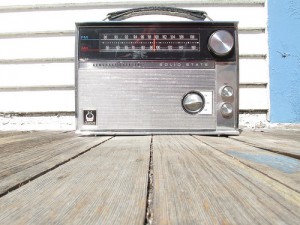Love, radio, and an unsolicited argument

Photo: Robert Ashworth, Creative Commons, some rights reserved
I’m usually a little shy to tell people that I think of radio storytelling as artistic expression. Because they’ll immediately point to one of my straight news stories and say, “Are you kidding? Definitely not art.”
And the hypothetical critic would be correct, in this case. Let’s say “art” entails complex meaning, creating something new out of raw materials, various interpretations, struggle, perhaps cigarettes, alcohol, and coffee, etc. These things don’t really happen in the making of a news spot – with the exceptions of the coffee and a little writer’s block.
Creating news spots is a matter of craft and practice.
But it’s not always about getting information across as quickly as possible. In the making of certain mini radio documentaries, so much else happens. Listeners get transported through a tunnel of layered sounds, which paint a picture and tell a story. OPTIONAL: Like in this piece of sound art, for example, whose content is also an argument for the form.
REQUIRED: Now consider this, which is what I actually meant to be writing about. It’s a program called Love + Radio. This is a storytelling program – just like your neighborhood This American Life or The Moth – but bolder. The creator, Nick van der Kolk, has a unique, film-inspired vision and technique for delivering sound and information. Nick describes his show as “a very musically inclined, non-fiction radio experience.” HowSound host Rob Rosenthal writes:
“Auteur” or “auteurship” are not words you hear too frequently in radio circles. I’m not sure why. It’s mostly used in film when describing how a director’s unique vision and style is evident in a movie. Think Hitchcock and Kubrick. But it could easily apply to radio producers like Kitchen Sisters, Ira Glass, and Jad Abumrad.
I’d add Nick to that list, too (along with his collaborator Brendan Baker). Listen to a “Love + Radio” podcast and you’ll hear why. There’s nothing like it in audio storytelling — the production style and the subject matter immediately say “Love + Radio.”
This idea of auteurship in radio, and L + R itself, are inspirations for me at the moment. I’ve done some experimental documentary stuff before, and I’m starting to do more of it. You probably won’t hear much of that on the NCPR airwaves, but I’ll keep you posted here on All In.
I recommend starting out with “The Man in the Road” and “The Businesswoman” episodes of L + R. And that HowSound episode I quoted is pretty fascinating, too. Warning: be sure to listen on decent-quality speakers or headphones, but not around young kids or the faint of heart.
Tags: art form, documentary, entertainment, experimental, love + radio, storytelling, zach hirsch








I decided to assign to myself the homework project of considering every nook and cranny of your article. This topic is of great interest to me, first off because I’m always thinking about where “art” leaves off and, well, something else begins. It seems you’re hitting the notion of definitions and their importance (or not), and also their abuse. I’ll begin by running all of your links. Before rolling over in my current fog of insomnia, I figured I’d run one of them, and, oh my! — that Transom piece involves several people I’ve worked with (most of my life has been lived in Chicago). In fact Carol worked with me for a couple years in an ensemble I organized. It’s becoming fun already.
Thanks for your interest, Bob!
Not at all! You tickled an especially ticklish part of me, is all. A few exigencies have closed in on me so “homework” will be less than top priority for a few days to a week. This will not be forgotten. I tend to look for art in most things I read, view, or hear. I find it from time to time right here in NCPR postings. Sometimes the posting is intended to be “artistic” (I’d put “philosophical” in there), sometimes it’s intended to be “journalistic”, but what brings me back here is the probability of more than just dry reportage. Peace…out.